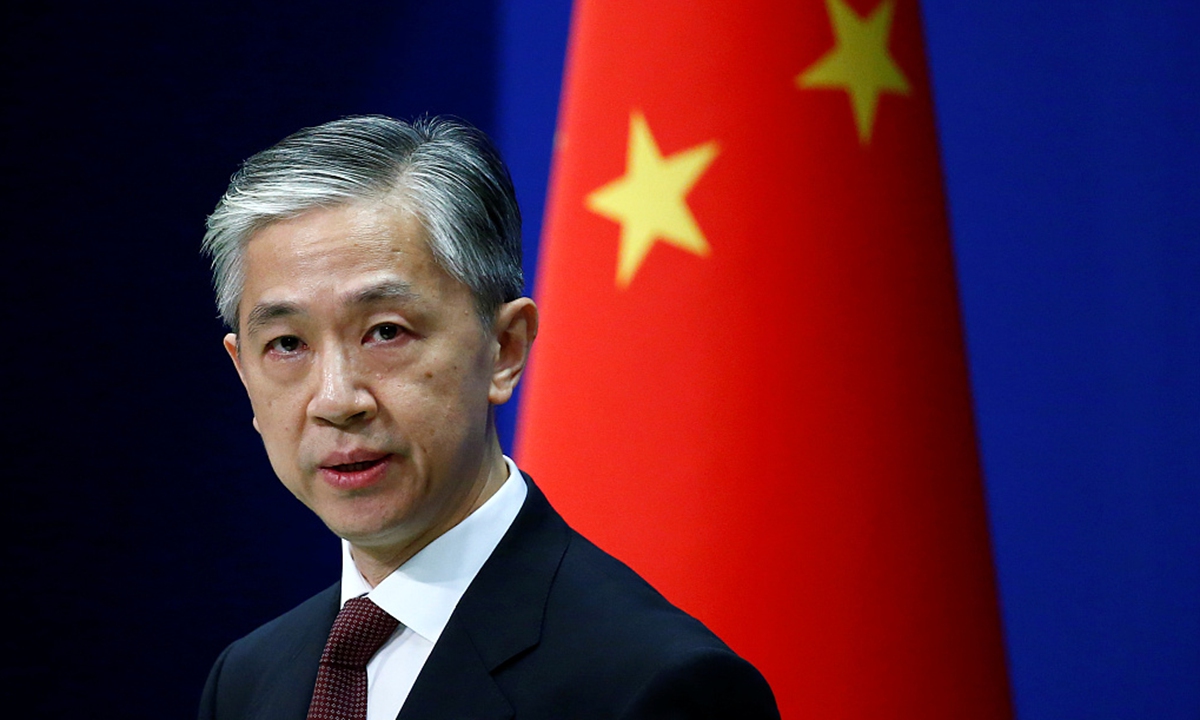China urges Japan to clarify ties with Taiwan island, condemns politician’s statement aimed at ‘military deregulation’

Chinese Foreign Ministry spokesperson Wang Wenbin. Photo: VCG
China has lodged solemn representations with the Japanese government and urged it to clarify on the matter and make ensure it will not happen again, Chinese Foreign Ministry said on Tuesday, after Japan's deputy defense minister vowed to protect the island of Taiwan "as a democratic country."
Chinese observers said the Japanese deputy defense minister's remarks were an obvious interference in China's internal affairs and a challenge to China's bottom line, which were very rarely seen before.
Wang Wenbin, spokesperson of China's foreign ministry, said at a press conference on Tuesday that some Japanese politicians, disregarding the fact of China's peaceful development, unjustifiably criticized China's economic and social development including its normal national defense building, played up the so-called China threat theory, and openly provoked confrontation between major powers.
It is extremely treacherous, irresponsible and dangerous to seek excuses for Japan, which has a past of crimes and militaristic aggression, for military deregulation, Wang said, condemning the comments by the Japanese politician.
Wang's remarks came after Japan's State Minister of Defense Yasuhide Nakayama on Monday warned of the "growing threat" posed by Chinese and Russian collaboration and said it was necessary to "wake up" to Beijing's pressure on Taiwan island and protect the island "as a democratic country," Reuters reported.
Wang noted that this Japanese politician openly referred to Taiwan as a "country," which seriously violated the principles of the four political documents between the two countries - including the China-Japan Joint Communiqué - and seriously went against Japan's solemn commitment on many occasions not to treat Taiwan as a country.
Hu Jiping, vice president of the China Institutes of Contemporary International Relations, pointed out that Nakayama and Japan's Defense Minister Nobuo Kishi recently made such flagrant mistakes and unprecedented diplomatic statements, which obviously interfered with China's internal affairs and challenged the country's bottom line.
Kishi said in an interview with Bloomberg last week that the security of the island of Taiwan was directly linked with that of Japan, and that Taiwan island's defenses are "increasingly overshadowed" by the Chinese mainland's military might.
The Taiwan question is China's internal affairs and Nakayama's claim of "protecting Taiwan" is ridiculous, Hu said.
There is only one China in the world, and the island of Taiwan is an inalienable part of Chinese territory, Wang reiterated.
The Taiwan question bears on the political foundation of China-Japan relations, on the basic trust between the two countries and on the international rule of law and justice, Wang said.
"We solemnly urge the Japanese government to earnestly honor its promise on the Taiwan question, be cautious in its words and actions, and refrain from undermining China's sovereignty in any form or sending a wrong signal to the 'Taiwan independence' forces in any form," Wang said.
"What I want to stress is that China is resolute in safeguarding its national sovereignty, security and reunification. China must and will reunify. This is an irresistible trend of the historical process," Wang said.
Hu said that the warning by Nakayama over the "growing threat posed by Chinese and Russian collaboration" was "very inappropriate." China and Russia are two sovereign states, and their cooperation is not against any other countries, but conducive to global strategic stability, Hu said.
However, the US has colluded with its allies, including Japan, claiming that China and Russia are "threats" and "enemies," which is nothing more than trying to use its allies to contain China and Russia and maintain its hegemony, Hu said, noting that this practice is provoking conflicts among major powers and worsening the global strategic environment.
Japan's diplomacy has undergone great changes over the past year, Hu pointed out. While strengthening cooperation with the US, the Suga administration has a very clear direction, which is targeting China, Hu noted.
Japan's economy is heavily dependent on the Chinese market. But if Japan continues to join the Western anti-China club and interfere with China's internal affairs, the deterioration of political-security relations between China and Japan is bound to spill over to economic cooperation, Hu warned.

